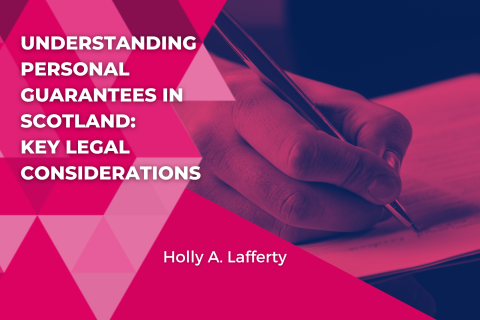It is becoming increasingly common for lenders to look for ways to ensure payment when advancing funds. This is commonly done by way of personal guarantee.
What is a personal guarantee?
A personal guarantee is an individual's legal promise to repay credit issued to a business for which they serve as an executive or partner. Providing a personal guarantee means that if the business becomes unable to repay the debt, then the individual is personally responsible. As such, a personal guarantee should not be signed lightly.
The general rule is that when accepting a personal guarantee from a third party, the lender is entitled to act in its own interest. In Smith v Bank of Scotland 1997 SC (HL) 111, Lord Clyde explained at p 117:
"it is well settle that as a general rule the [guarantor] is expected to look to his own interest and to make such inquiries as he considers necessary or appropriate"
Enforceability of a personal guarantee
The main grounds upon which a Personal Guarantee can be challenged in Scotland are misrepresentation, promise, error and prescription.
The lender cannot misrepresent the position. Even a half-truth can be a misrepresentation: if the lender makes a representation (oral or in writing), it must be full and fair. Separately, if the guarantor makes a statement in the Bank's presence that indicates she did not understand the debtor's position, that must be corrected, as seen in the above case of Smith v Bank of Scotland. For example, if you rely on a false representation that induced you to sign a personal guarantee, you can challenge the guarantee on the grounds of misrepresentation.
If the lender used clear words either in writing or verbally that it will unequivocally not enforce the personal guarantee for a certain period of time or until something is done then a legally binding promise may have been created which could be relied upon to defend enforcement proceedings brought by the lender.
If the personal guarantee was signed on terms which, by mistake, do not reflect the agreement between you and the lender, then it can be argued that there is no agreement due to error. However, the current law in Scotland is that for the personal guarantee to be rendered void and unenforceable, there must not only be error but also some other factor such as the bank acting in bad faith.
Personal guarantees are also subject to the five-year time limit set out in The Prescription and Limitation (Scotland) Act 1973. That means that if a lender has not taken any steps to enforce the personal guarantee within five years of it becoming enforceable, the guarantor's obligation to repay the debt will have prescribed.
Recent case law
McKinlay v Avellierie Limited & Kenneth Scott [2025] SAC (Civ) 6 case concerned a loan advanced by Company C to Company A. The agreement included a personal guarantee from the Director of Company A. The debt was thereafter assigned to the Director of Company C, and the question before the court was whether that assignation included the right to enforce the personal guarantee. It was held that the personal guarantee did transfer alongside the loan debt.
Why Legal Advice Is Crucial
Personal guarantees are intricate contractual agreements on which a guarantor should take independent legal advice prior to signing. It is imperative that a guarantor understands the scope of their exposure under a personal guarantee. If you are asked to sign one, or if you are facing enforcement action, obtaining specialist legal advice is essential. A solicitor can help you:
- Understand the scope of your personal liability
- Identify any potential defences or grounds for challenge
- Negotiate terms or reach a resolution with the lender
At Miller Samuel Hill Brown, our litigation experts provide tailored advice on personal guarantees in Scotland. We help business owners and individuals understand their legal obligations and protect their personal interests by taking the time to understand your unique situation, address your concerns, and provide tailored solutions that make a real difference.
Contact our litigation team today for clear, strategic legal guidance.














